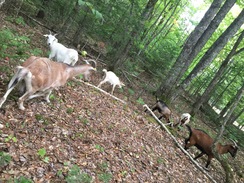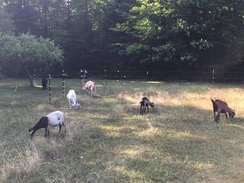Why Kiko Goats?
I ask, why not?
Often, I am asked the same two initial questions when I am chatting with friends, customers and even co-workers about life on the farm or ranch. First ... why goats? And second ... why Kikos (key-kos)?
You may have your own answer to the first question already. Or you might be like many others who are just getting started, asking, well why small ruminants and not cattle or some other type of livestock? Any goat lover, owner or rancher could answer the first question with any variety of reasons. My answers might include, goats are different, resourceful, intelligent and my personal favorite, inquisitive. However, my number one reason is goats are less intimidating, given I am not a farmer or rancher by trade. Doesn't the saying go something like, size does
That's not to say goats don't have their challenges and don't require a solid understanding before diving in. However, commercial goats have a relatively low price point to get started and have a reduced overall footprint when compared to larger livestock. Smaller barns,
The answer to the second question, of why Kikos, requires a two-part answer. The first part of the answer is short. Did I want to raise dairy, fiber or meat goats? My arrival at meat goats was quite simple. Did I have time to milk goats every day or harvest fiber? Sure goats require attention every day including a variety of chores. However, milking them twice a day and completing all of the other associated work just isn't in the cards with my
The second part of the answer focuses on deciding what meat breed is right for me and why? There are a few standout meat breeds in North America including Boers, Kikos, Myotonic or Fainting and Spanish goats. Each
The Kiko goat breed was derived from feral stock, originally from New Zealand. Consequently, unlike other goat
Aside from the typical characteristics of meat goats, mentioned previously, first and foremost,
Kikos also show greater parasite resistance where many other goat breeds may only show resilience, for example, to the barber pole worm or Haemonchus
Like many who are embarking on something new, exciting and maybe even a little overwhelming, I did a fair amount of reading and inquiring with local goat producers to better understand how to get started. I likely touched on just a few
Resources
For more detailed information on "Thinking Outside the Fence", visit the National Kiko Registry (NKR) at nationalkikoregistry.com
For more detailed information on the "Kiko Advantage", visit the American Kiko Goat Association (AKGA) at kikogoats.com
Monday, November 21, 2022



